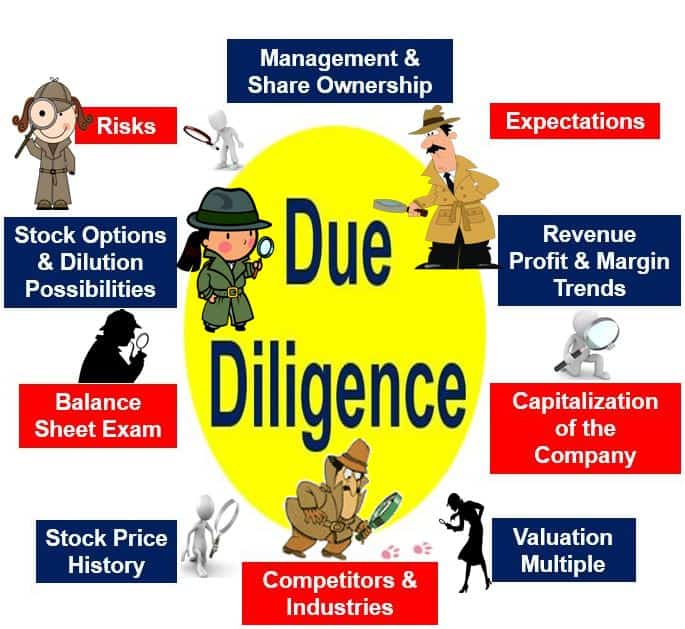Due Diligence refers to the detailed examination of a business and its financial records – it is carried out before committing to a business arrangement such as a merger, acquisition, or any type of important contract. It is an audit of a potential investment or arrangement to confirm all the facts before going ahead.
The term ‘due diligence’ describes the care a reasonable individual should take before undertaking a transaction or entering into an agreement with another party.
Suppliers
When a supplier is determining whether to offer terms of payment to a customer, he or she will carry out due diligence – analyze items that may provide information on the buyer’s ability to pay bills properly and on time.

The aim is to ensure that every stakeholder associated with a financial endeavor has the information needed to assess risk accurately.
Put simply, before signing an important business contract, you check out the other party to make sure they are able to adhere to the terms – you want to confirm that you get what you believe you are paying for.
Due diligence is required when issuing a patent to make sure that the patent holder is really intent on developing a product around a patent, and is not only trying to prevent others from doing so.

Financial due diligence
Any organization that is considering a deal must check all the assumptions it is making regarding that arrangement. Financial due diligence provides peace of mind to financial, corporate and individual buyers, by analyzing and validating all the commercial, operational, financial and strategic assumptions being made.
One party examines the other’s trading experience to form a view of the future and to make sure there are no ‘black holes’.
Mergers & Acquisitions
For any type of company acquisition, due diligence includes a complete understanding of the company’s obligations, including: pending and potential lawsuits, debts, leases, long-term customer arrangements, warranties, employment contracts, compensation arrangements, distribution agreements, and so forth.
When seeking sensitive information from another company, before releasing it that company will ask the enquirer to sign a non-disclosure agreement – a confidentiality contract.
The word ‘due’ means completing the necessary steps to accomplish something, while ‘diligence’ means to stick with something until it is done.
If you did everything you could to protect your interests in a business deal, you carried out due diligence. If you want to buy 100 acres of land and use it for farming, you should check to make sure it can be used as a farm, confer with the water company to make sure there is water, and contact the electric company to be certain that electricity is available. You might also rule out the possibility that the seller has used the land as collateral on a debt – this is all due diligence.

Every merger & acquisition deal today involves varying degrees of due diligence. No shareholder or sensible company director would vote in favor of making a move without first checking out the other party thoroughly.
Due diligence by the seller
In an acquisition, it is not only the buyer who carries out due diligence – the seller does too. If you are the seller you will want to be sure that:
- The buyer has the funds to complete the transaction.
- The buyer’s stocks have a good record if part of the payment for the purchase of your company is in the form of stocks.
- The stocks are still worth something when your lockup period expires.
- The buyer has a reputation of sticking to their commitments.
- They treat your employees properly.
- They treat your customers properly.
- The corporate cultures of the two companies are compatible.
- The ‘earn out’ component of the deal, if there is one, is realistic. Does the acquirer have a track record of successfully marketing your type of product?
- Will they be stretched too thin after this acquisition?

Due diligence in Virtual Data Rooms
Experts say that in future due diligence will be carried out increasingly online, in *Virtual Data Rooms – in fact, this is already occurring today.
* A Virtual Data Room, known commonly as a VDR, is an online repository of data that is used for storing and distributing documents.
When checking out the other party, it is vital that you get the right people and the correct information at the right time. Virtual Data Rooms allow individuals and companies to prominently display structure and categorized data which can significantly improve value by shorting deal times, minimize transactions costs, and allow for the free exchange of information.
The evolving landscape of due diligence in the digital age promises to enhance cross-border transactions by streamlining the verification process through advanced analytics and artificial intelligence.
Video explanation
